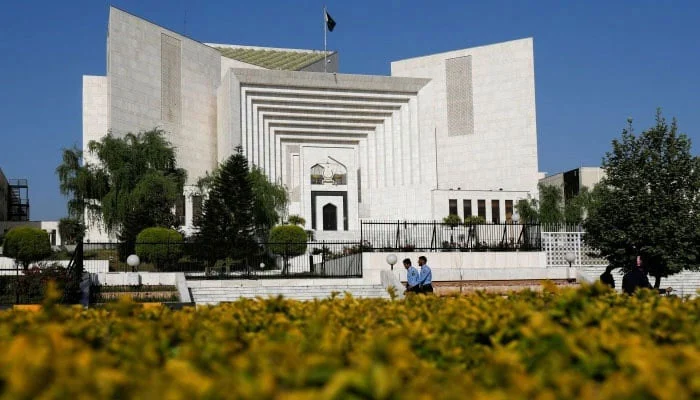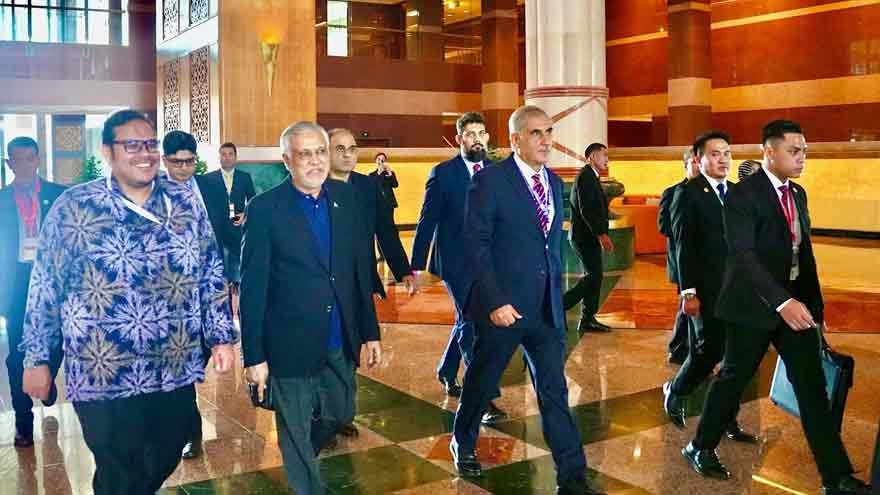In a significant legal development during the Faizabad sit-in case proceedings, the Supreme Court of Pakistan has made remarks indicating the broadened powers of the inquiry commission. The court suggested that the commission would have the authority to summon former army chiefs, prime ministers, and chief justices, and it could also arrest those who do not appear before the commission upon summons.
The hearings regarding the implementation of court decisions in the Faizabad sit-in case are being conducted under the leadership of Chief Justice of Pakistan, Justice Gulzar Ahmed, with a three-member bench including Justice Amin-ud-Din Khan and Justice Atir Mahmood.
The Supreme Court took a notable stance, rejecting the second review petition filed by former federal minister Sheikh Rashid. The Chief Justice questioned Sheikh Rashid’s decision to withdraw the petition and inquired about the reasons behind this change.
Sheikh Rashid’s counsel responded by stating that Sheikh Rashid is present in the court and that there might be some misunderstandings arising from intelligence reports. This led to the re-filing of the review petition, bringing it back under the scrutiny of the court.
Chief Justice Gulzar Ahmed further inquired into the withdrawal of the petition and asked why Sheikh Rashid had initially opted for a review and then decided to retract it. Sheikh Rashid’s counsel explained that there were some misinterpretations based on intelligence reports, prompting the withdrawal of the petition.
During the proceedings, Chief Justice Gulzar Ahmed also raised questions about the inclusion of a representative from the Ministry of Defence in the inquiry commission. He questioned why a representative from the Ministry of Defence was not part of the commission. The Attorney General presented the notification of the inquiry commission in the Supreme Court, seeking approval.
In the course of the discussion, the Chief Justice emphasized the need for transparency and independence in the inquiry commission’s investigations. He pointed out that the commission must work freely and transparently to conduct fair investigations into the Faizabad sit-in case.
Furthermore, the Supreme Court directed the federal government to add an additional member to the inquiry commission, suggesting that a single review petition for multiple summonses was unusual. The court questioned whether these simultaneous requests were made as a result of a decision or a directive.
The Chief Justice expressed concern over the state of the country’s judicial system, emphasizing the importance of independent and transparent investigations. He raised questions about the sequence of events and the need for clarity on why nine review petitions were filed simultaneously. The court underscored that decisions should not be influenced by external pressures and called for a fair and impartial inquiry.
Former Chairman PEMRA, Absar Alam, who is part of the inquiry commission, shared his concerns about the inclusion of former government officials, ISI officials, or former Chief Justices in the commission’s proceedings. The court responded by asserting that it would not point fingers at anyone and that the inquiry commission should complete its work independently.
As the inquiry commission’s powers expand and questions arise surrounding the Faizabad sit-in case, the Supreme Court is positioning itself as a guardian of justice, emphasizing the importance of transparent and unbiased investigations. The unfolding legal proceedings underscore the complex nature of the case and its implications for the country’s political and judicial landscape.
The Chief Justice has urged caution in prematurely expressing concerns about the commission, emphasizing that Inquiries should be allowed to carry out their work independently. In a recent statement, he advised against casting doubt on the competence of the commission, which holds the authority to summon former Prime Ministers, Army Chiefs, and Chief Justices.
Justice Ata-ur-Rehman highlighted that the commission possesses the power to arrest those who do not respond to summons. The Chief Justice called for the nation to trust that the Inquiry Commission would live up to expectations, acknowledging the public’s anticipation regarding its proceedings and its impact on national figures such as Abseer Alam.
Former PEMRA Chairman, Abseer Alam, acknowledged the remarks made by the court. However, the Chief Justice encouraged disregarding these remarks and focusing on the official orders issued by the court. He underlined that the court’s orders are what matter, and many questions and discussions are meant to be addressed within the legal proceedings.
Justice Ata-ur-Rehman addressed Abseer Alam’s removal from the Prime Minister’s office, stating that those dismissed from the Prime Minister’s office can be investigated, including the former Prime Minister and Army Chief.
Abseer Alam asserted that the Supreme Court had rejected the appeal against his dismissal. The Chief Justice responded by stating that if he desires to appeal against the removal order, the case needs to be reinstated. Once reinstated, the court can hear the appeal. The Chief Justice expressed hope that this clarification is understood and advised Abseer Alam to consider whether he wants to proceed with the appeal.
Justice Ata-ur-Rehman remarked on the government’s establishment of the commission, urging it to let the commission complete its work before passing judgment on its efficacy. Abseer Alam stated that he does not wish to be reinstated but rather aims for improvement in the justice system.
Chief Justice Justice Qazi Faez Isa stated that they would not point fingers at the commission, emphasizing that whether to reinstate the appeal or not is Abseer Alam’s decision. He clarified that the commission has the authority to investigate, and if it demonstrates effectiveness, accountability measures will be applied.
The Attorney General stated that if the commission requires more time, the federal government will provide additional time by recording justifications. Justice Ata-ur-Rehman questioned the commission’s capability to deal with the matter, to which the Chief Justice responded that the commission had initially been given duties and responsibilities but had deviated from them.
Chief Justice Qazi Faez Isa clarified that they would not issue any directives to the federal government. He stated that they were only expressing reservations, and after two months of the commission’s work, they could provide feedback based on the commission’s performance.
Abseer Alam expressed hope for a fair evaluation of his case. Chief Justice Qazi Faez Isa concluded by emphasizing that the commission would not be undermined, highlighting the importance of impartial investigations, and stating that the commission’s performance would determine its accountability.



